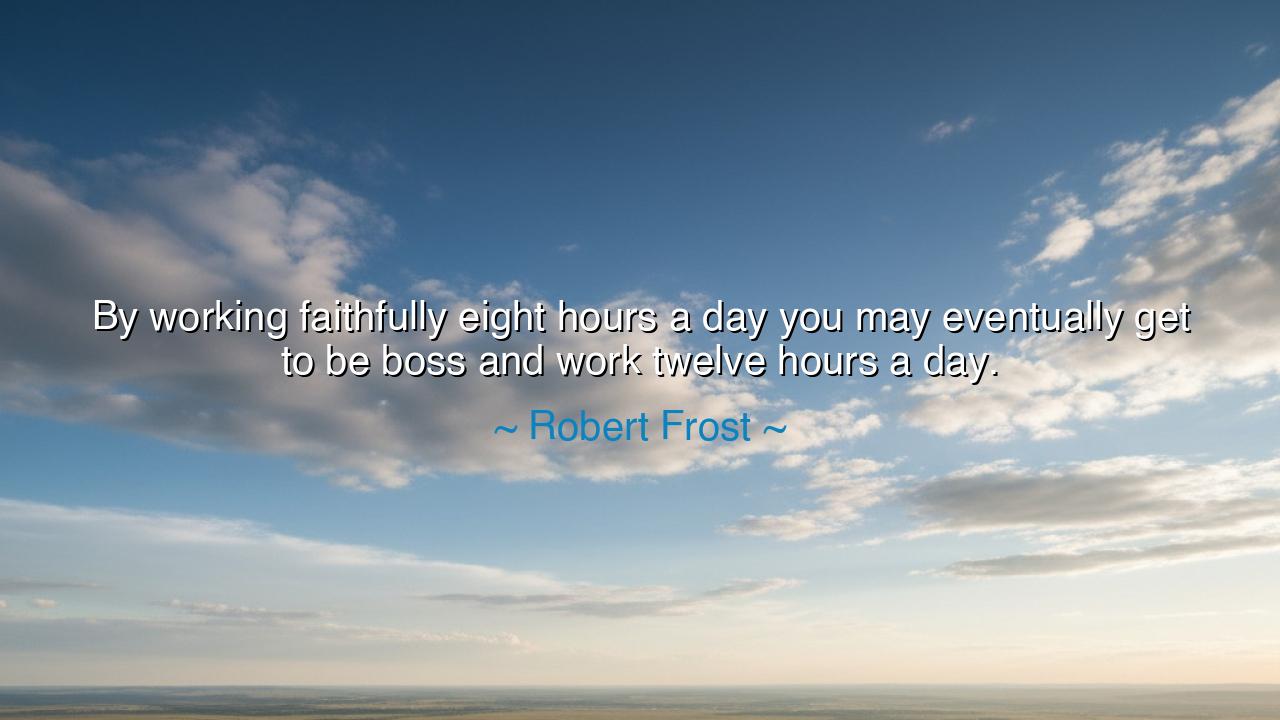
By working faithfully eight hours a day you may eventually get
By working faithfully eight hours a day you may eventually get to be boss and work twelve hours a day.






Listen well, O children of labor, to the words of Robert Frost, the poet who wandered both nature and the human heart: "By working faithfully eight hours a day you may eventually get to be boss and work twelve hours a day." In this utterance lies the ancient truth that the path of diligence is both reward and trial, a mirror to the cycles of effort and responsibility. Faithful work earns elevation, yet with elevation comes the weight of added duty, revealing that all gains bear their consequences.
In the forge of life, the hand that labors with steadfastness discovers that mastery is accompanied not only by honor but by increased toil. Frost, with his keen eye for human nature, teaches that ambition and dedication summon both reward and burden, and that the ascent to leadership is a journey marked by longer hours, greater care, and the weight of guiding others. The promise of promotion is entwined with the price of greater responsibility.
The ancients, too, understood this law of effort and consequence. The warrior who trained tirelessly to lead, the scholar who devoted decades to wisdom, each encountered the paradox: the higher the station, the greater the labor demanded. To sit at the helm is to bear not only one’s own duties but also the care of all those entrusted to one’s guidance. In this, the heart is tested, the spirit refined, and the soul learns the measure of true diligence.
Yet this teaching carries a subtle gift: it warns the seeker to labor with both prudence and awareness. Ambition, though noble, is not a cloak against the burdens it brings. Frost’s words illuminate the delicate balance between work and desire, between striving and wisdom, urging all who climb to recognize the full measure of what they seek. Faithful labor, pursued with understanding, becomes both the ladder and the mirror of one’s soul.
Therefore, O descendants of perseverance, let this teaching lodge within your hearts: the path of faithful work leads to honor, yet with honor comes expanded duty. In embracing the toil that follows elevation, one discovers that leadership and responsibility are inseparable, and that the soul’s measure is found not in ease, but in the courage and steadfastness with which one bears the labors entrusted. In this, the wisdom of ages whispers, guiding each hand and heart along the eternal journey of work and purpose.






CTLe Cam Tu
There’s something both cynical and humorous in Frost's words. It’s as if he’s showing us that the harder we work, the more we end up doing. In a sense, becoming the boss might just mean a new set of challenges. I wonder, though, is the ‘boss’ role really about power, or is it just a more demanding job? Could this be Frost’s way of warning against ambition that only leads to more exhaustion?
Ttwix
I find this quote to be quite insightful about the hidden costs of success. Many people chase promotions thinking they’ll get a better work-life balance, but Frost's words remind us that success often comes with more pressure. It’s kind of a harsh reality, don’t you think? Does this mean we should reconsider the traditional idea of climbing the corporate ladder? What’s your take on how we can balance ambition with personal well-being?
VQ33_Nguyen Van Quang_10A3
This quote definitely makes you think about the relationship between hard work and the reality of promotion. We often strive for advancement, but is it really worth it if it just leads to more stress and longer hours? I think Frost is pointing out the irony that being 'boss' doesn’t always mean easier. Do you think that’s a fair trade-off for success, or is there a better way to work smarter, not harder?
LVtu le viet
I can't help but laugh at this quote. It's like Robert Frost is giving a wink and a nudge about the reality of success. You work hard, you get promoted, and then suddenly you're expected to work even harder. It’s a bit of a catch-22, isn’t it? Do you think that the more success we gain, the more responsibility (and hours) we have to shoulder? Is that just the price of climbing the ladder?